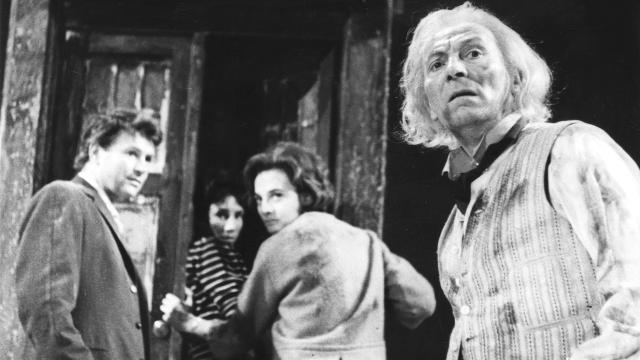Nearly 60 years to the day that Doctor Who began airing, next month, the BBC will launch an unprecedented collection of over 800 episodes from the show’s distant and not-so-distant past on its streaming platform, iPlayer—the first of its kind from the corporation. But it turns out that the very first story that kicked all those adventures off in the first place won’t be a part of it.
Known by the title of its first episode, “An Unearthly Child,” the four-part serial was written by Anthony Coburn, at the time a staff writer for the BBC, who would go on to write three more stories for Doctor Who that never made it to air. Those included two unnamed serials that were never brought forward, as well as “The Robots,” which was intended to be the second serial broadcast for the series, but was ultimately replaced with Terry Nation’s “The Daleks,” which catapulted Doctor Who on a very different trajectory. Coburn went on to rework “The Robots” into a new story titled “The Masters of Luxor,” but after it was repeatedly delayed in filming due to scheduling issues and eventually rejected, Coburn severed all his ties to the series.
Decades later, Coburn’s son, Stef Coburn, has repeatedly pushed back against the BBC over what he perceives as a mistreatment of his father—especially over the conceptual ideas behind, and eventual name of, the Doctor’s time-travel machine, the TARDIS. Coburn first attempted to legally challenge the BBC’s ownership of the TARDIS in 2013, timed to the 50th anniversary of Doctor Who—alleging that the corporation lost the rights to use ideas leveraged in Coburn’s script for “An Unearthly Child” when he died in 1977, despite the corporation having held various copyrights and trademarks on the ship and its police box design for decades prior.
Now, a decade later, Coburn has taken to social media to confirm that he has rejected attempts by the BBC to license “An Unearthly Child” for streaming on its platforms, claiming that the corporation refused a proposed deal to license the story.
“This massive iPlayer back catalogue will be home to over 800 hours of Doctor Who content, making it the biggest ever collection of Doctor Who programming in one place,” a BBC representative said in a statement to Radio Times. “But [it] will not include the first four episodes as we do not have all the rights to those.”
As to why the BBC doesn’t own the streaming rights to the very first story of one of its biggest original series, the answer is… complicated. Much for the same reason that hundreds of episodes of Doctor Who’s earliest history were lost in the process of archival junking, television in the 1960s was not made with the forward thinking in mind that repeat broadcasts (and of course evolutions in the form, like home media releases or streaming, in the decades since) would become such a prevalent part of the media landscape. That’s something especially important now, as modern Hollywood reckons with years of denying the creatives behind its content adequate residual compensation, an issue at the heart of this year’s dual WGA and SAG-AFTRA strikes. Even in situations like Coburn being assigned to Doctor Who in the ‘60s as a staff writer would see the rights to individual scripts remain with their writers, with the perception that these broadcasts were one-and-done situations. Hindsight of Doctor Who’s massive success with the advent of “Dalekmania” in the ‘60s wouldn’t have changed that either, it was simply the standard of the time.
“An Unearthly Child” has been available in various formats in the years since its broadcast—it’s currently available for streaming on Britbox, for example, and has been commercially released on various home media formats, including most recently as part of home releases of the 50th anniversary docudrama An Adventure in Space and Time. But Coburn has now alleged that he intends to let any such licensing deals deprecate once they expire. In other threads on X, the platform formerly known as Twitter, Coburn further stated that as part of his continued claim against the BBC he plans to sell his father’s rights relating to “An Unearthly Child” to “an ENEMY of the BBC, possessing ALL the resources required to act against them.”
As to why Coburn is only just now pushing against this—given that his previous use of the 50th anniversary of Doctor Who to launch claims against the BBC, it doesn’t seem too far-fetched that the opportunity created by the show’s 60th is a factor. But Coburn has also previously publicly lambasted the direction of contemporary Doctor Who at large. On X, between retweeting conspiracy theories about COVID-19 vaccinations and various strains of bigoted commentary, Coburn previously described the casting of Ncuti Gatwa as the latest incarnation of the Doctor as “an OUTRAGE at what generations of progressively MORE corrupted BBC filth” have done to Doctor Who. So it would at least seem on the surface that this is less about giving credits where it’s due to a writer who helped launch one of the longest-running sci-fi series in history, and more about one man trying his damndest to spite its creators for increasingly unhinged reasons.
Want more entertainment news? Check out when to expect the latest Marvel, Star Wars, and DC releases, what’s coming to cinemas in Australia this year, and everything streaming this month across all platforms. Check out our dedicated Entertainment tab for more.
